Hunt: Showdown is our sleeper hit of E3. When Crytek announced it in 2014, it looked like a pretty bog-standard Left 4 Dead clone. But at E3 it reemerged as one of the most visually stunning and conceptually engrossing games we’ve seen for a long time. Gone is the Left 4 Dead inspiration, instead Hunt: Showdown is like if Evolve, Stalker, and Resident Evil 7 had a big, demonic baby.
Trust us, Hunt: Showdown promises to be one survival game actually worth caring about. It’s bold, original, and uncompromising in its vision for an asymmetrical PvPvE shooter where five teams of two stalk through swamps and moors trying hunt demons while avoiding one another.
For a more in-depth analysis of the demo we saw, check out Steven’s preview, and see the game for yourself in the video above. Even with all that, Hunt: Showdown was so exciting to everyone at PC Gamer that a few of us just had to talk through what we witnessed at E3.
Gritty horror influence
James: I’ve been waiting for a horror game like this. Hunt’s zombies don’t look like cartoonish brain-hunting undead. They look like rotting people, real humans that scream at the top of their decaying lungs when they see you (another ambient location alarm). And that spider. Jesus. When I think of spiders in games, I imagine Skyrim’s slow, hulking tarantulas or Limbo’s silhouetted bus-sized arachnid. They’re gross, sure, but don’t actually behave like any spider I’ve seen. Hunt’s spider is fucking awful, and that’s a compliment. It skitters around almost too fast for the eye to see and takes a second to recognize against the backdrop of an old wooden bar. When you do see it and squint you realize that barely perceptible movement that caught your eye in the first place is the glitter of far too many eyes against torchlight and the gentle gnashing of impossible mandibles.
Steven: James stop it. That thing seriously creeped me the fuck out and I don’t need you describing it so vividly.
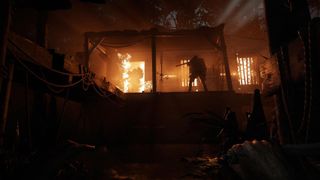
The horror in Hunt is deliberately understated to stay as realistic as possible.
Evan: We only saw it for about a minute, but I loved that the thing didn't seem to be a capital-V, capital-B Videogame Boss with weak points and telegraphed attacks and all the trimmings. It was an abomination that did unpredictable, unscripted shit, and it needed to be sent back to hell.
Tim: I dug that Daddy Eightlegs actually didn’t seem hard to kill though. They’re not trying to create Evolve-style monsters to wear down. It seemed like taking out a target was meant to be an intense but brief encounter, setting up the real climactic meat of avoiding/killing the other players on your way out with the loot.
Comic deals, prizes and latest news
Sign up to get the best content of the week, and great gaming deals, as picked by the editors.
Steven: Exactly. It’s just a catalyst for PvP conflict, which I think is perfect. There’s never a moment in Hunt: Showdown where it feels like something unexpected can’t jump out at you—be it a monster or another team of hunters.
James: Moving on from the spider—please, let’s please move on—Hunt doesn’t overdo the whole Satan thing either. It reminds me of the 2015 movie The Witch, where folklore is depicted as realism with little to no special effects whatsoever. If a goat is Satan, then a it’s depicted as a goat. No frills: what’s there, given the context, is spooky enough. In Hunt, banishing a monster to hell or closing a portal doesn’t kick off a flashy sequence where a demonic voice speaks in tongues or hisses in pain. During the demo, the spider just embered and dissolved into nothing while the portals closed like paper burning in reverse. It’s biggest scares aren’t in theatrics, they’re in the shadows flitting over the horizon or the distant flash and clap of gunfire. The horror in Hunt is deliberately understated to stay as realistic as possible, and only dotted with curious, arcane happenings.
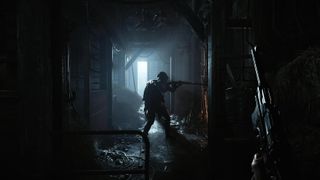
It has the best darkness we've seen
Evan: Singleplayer and horror games, like Thief, have made darkness a prominent part of their gameplay. But watching the Hunt demo made me realize that the vast majority of games actually deal in shades of dimness, not the impermeable black that the team of two players waded through in what we saw of Hunt. I can't think of a time when darkness simultaneously felt unsettling and comforting in a game—it's a source of security and dread.
Steven: It only took me all of 20 seconds before I realized Hunt: Showdown might be the most visually striking game I’ve seen in years. I watched a team of hunters skulk through a swamp, the surrounding copse of trees silhouetted by ominous moonlight, and I was mesmerized by how atmospheric the scene felt. But darkness isn’t just pretty in Hunt: Showdown, it’s also crucial to survival.
Combat in Hunt seems extremely fatal, and with five teams competing for the same objectives, when to give away your position is a dreadful decision to make. Darkness is like a shield that protects you, but eventually you’ll have to cast it aside to fight enemies or creep into the illuminated supply zones to get more ammo. It’s been awhile since I’ve seen the tension between light and dark used so effectively.
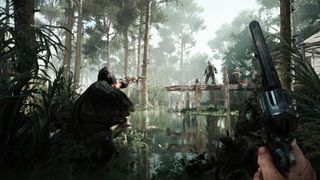
At any given time you can’t truly be sure how many opponents are left prowling the map.
Tim: The idea of darkness also extends to starving the players of other information. One of the things that stuck with me most from chatting to the Crytek guys was that if you enter a map, and don’t like the look of how things seem to be developing, you can sneak off to an exfiltration point and just nope the hell outta there. That’s a cute option to have, especially if you’re a few runs deep into a character you like and don’t want to risk losing them. What’s really interesting about that feature, is that the remaining players aren’t alerted that you’ve left. Nor are any new players dropped into the map for that match. Which means that any given time you can’t truly be sure how many opponents are left prowling the map. I love that uncertainty. Perhaps you’re the only one there, even though it’s only a few minutes in. Or maybe HE’S RIGHT BEHIND YOU.
Aside from obvious influences like Battlegrounds and Left 4 Dead, the other thing I kept coming back to was The Dark Zone. The final bounty hunt sequence here sounds a lot like going rogue in The Division, and having already experienced the joy/horror of someone sneaking up and whispering “Hey buddy, whatchu doin’?” over proximity comms, I can imagine there’s going to be serious scope for griefing in Hunt. Which a certain type of player will doubtless love. That’s also clearly why Hunt’s team size is capped at two, as having larger groups roaming the map ganking people would be no bueno.
Permadeath makes every decision meaningful
Evan: When you survive a round of Hunt, you'll earn currency that you can spend on gear. Eventually you'll level up, unlocking more 'veteran' looks for your hunter along with the option of increasing your maximum health or acquiring new perks.
If you die in a match, you lose that character, and anything they're carrying. Imagine if Battlegrounds had permadeath across your account—that's essentially what Hunt is promising.
This aspect of Hunt really conveys how deeply Crytek are doubling-down on the game's principles. The one comfort is that there's a sort of 'bloodline'-level meta-progression that you bank with any characters you're playing, as Crytek described it to me. So you won't be starting totally from scratch on your fourth, seventh, or 109th character, but each death will hurt, and you'll have to weigh the risk/reward of a potential win against your history with that character.
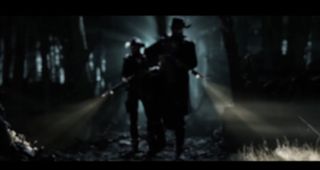
The thrill of winning is great and all, but really it’s the fear of losing that shakes me to my core.
Steven: One of the things that I really struggle with when it comes to survival games is that players never really have an impetus to take surviving all that seriously. In Playerunknown’s Battlegrounds, for example, I’m always willing to take a bold risk because, at worst, I’ll just lose a half hour of progress. Hunt: Showdown punishes death by permanently erasing some of your progress, making death a seriously scary consequence of combat. It’s a great design because it incentivizes treating every decision seriously and creates a sense of dread just as affecting as the oppressive atmosphere and monsters.
As a long-time EVE player, I think every PvP game should have more punishing consequences for death. It makes every engagement meaningful and that much more tense. The thrill of winning is great and all, but really it’s the fear of losing that shakes me to my core—whether it’s a ship in EVE or my hard-fought progress in Hunt.
...But it's not just a survival game
Steven: For everything Hunt has in common with survival games, it has another thing that’s different. Sure, you’re going to be stalking around the map trying not to die, but you’re also not scavenging for weapons or just trying to kill the other players. There’s no hunger gauges, no crafting, and no sense of persistence (except for character progression). Even if you manage to kill every other team, you’re still going to have to fight a boss, get their bounty, and escape the map without dying. Considering how much damage a few zombies did during the demo, even that seems like a tall order. Hunt: Showdown is as much a survival game as it isn’t.
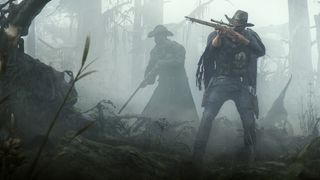
Early Access would be a good thing for this game
Steven: Leaving the demo, it was obvious that Hunt: Showdown is most likely going to launch on Steam’s Early Access or through some other closed beta program. It just seems like the kind of systems-driven survival game that needs that extra time in the oven, under the scrutiny of other players. With the avalanche of unfinished survival games already clogging up Steam, I wouldn’t blame you if that last sentence made you roll your eyes. But I actually think Hunt: Showdown should use Early Access.
It’s the kind of focused survival game that could enter into an open beta, get the player feedback it needs to become great, and launch months later.
A lot of games go to Early Access because they don’t have a clear vision for what they want to achieve. Instead, they hope that fans will help them discover what’s great about their game.That’s why so many games sit in Early Access for years and years. But, as we’ve already said, Hunt: Showdown’s vision is already strong and uncompromising. It’s the kind of focused survival game that could enter into an open beta, get the player feedback it needs to become great, and launch months later. The demo we saw was already incredible as a concept, it’s now the little details that need ironing out. While I share in that skepticism towards every new Early Access game, Hunt: Showdown using some kind of beta program could be a really good thing.
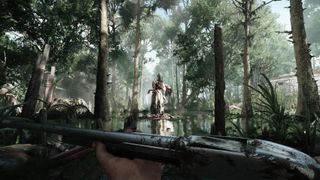
Amid our enthusiasm, a couple concerns
Steven: Assuming there’s not some fatal flaws in the execution, the ideas that Hunt: Showdown is built around are all great. That said, I think the biggest concern I have is what Hunt: Showdown will feel like after my 100th round as opposed to my first few. So much of Hunt hinges on the tension of confronting the unknown. However, eventually you’ll know exactly what kinds of monsters you’re up against and how to best deal with other hunters. I’d hate to see the day when Hunt: Showdown feels routine and formulaic.
I guess the only solution is that hopefully Crytek will introduce new boss monsters and maps to keep you on your toes. I’d love to see different weather effects and other variables that can change from session to session so that one game never feels quite the same as the next.
Evan: The footage also showed just a single boss monster, and only for a minute or less. In order to counter that increase in familiarity over time, Steven, Crytek will have to have a roster of threats that are diverse in their behavior and the strategies they prompt. You know from the outset what you're hunting, and I hope that each of these enemies demand different gear and techniques to find and take down.
The collective PC Gamer editorial team worked together to write this article. PC Gamer is the global authority on PC games—starting in 1993 with the magazine, and then in 2010 with this website you're currently reading. We have writers across the US, UK and Australia, who you can read about here.
Most Popular




